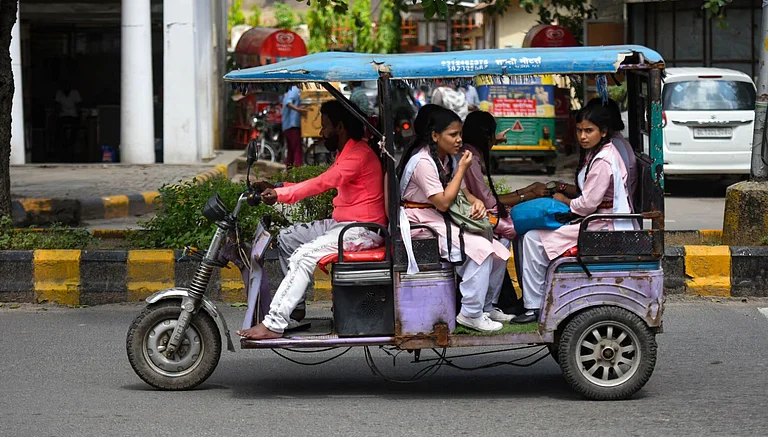Significantly, Shekhawat does not seem to have helped his cause. "If they don't have onions, let them eat apples" just about sums up his advice to voters. This hasn't gone down too well with an electorate fed up with spiralling prices, the major issue in the 1998 assembly polls. The anti-incumbency factor, after eight years of BJP rule, is strong and Shekhawat's studied effort to make price rise a non-issue "nobody ever died from not eating onions" has not succeeded.
The high cost of agricultural inputs, particularly power, has upset farmers and not even Shekhawat's promise of loan write-offs has mollified them. An index of growing frustration: in the midst of a public meeting last week, a farmer interrupted the chief minister's speech with the assertion, "we were better off with the Congress".
The ruling party's main plank is development, visible in the state's excellent road and telecom network and in the number of schools and hospital buildings which have sprouted on the rural landscape. Shekhawat's claim that Rajasthan is no longer a Bimaru state is no idle boast, as even the anti-BJP voters acknowledge.
But that's heavily outweighed by other factors. Excessive centralisation has led to an institutional breakdown: unfilled vacancies in just about all departments, interminable delays, a bureaucratic consolidation and deteriorating law and order. "Things just don't move," is a frequent complaint. Ministers and MLAs are seen as ineffectual because all files must go to the chief minister. Rajesh, a voter from Sikar, says: "During Congress times, you paid money and got your work done. BJP workers are not as greedy for money nor can they get work done. Go to an MLA and he says that he cannot get his own work done, much less yours." He underlines what has become one of the BJP's main problems a demoralised cadre.
With little stake in governance, the BJP worker isn't enthused by a continuation of Shekhawat's reign. It is on this dilution of will that party general secretary Govindacharya has been compelled to concentrate. He has tried to address party workers' frustrations by introducing new faces, although not quite as many as he would have liked. Shekhawat chipped in last week by touring constituencies and holding workers' meetings.
The BJP has alienated whole sections. Students are upset with mismanagement of universities, manifested last week by the suicide of Nishant Bhardwaj, a Jaipur-based student protesting against a six-month delay in the announcement of results by Rajasthan university. Shekhawat made matters worse by not visiting the hospital and dismissing the incident as the governor's responsibility. State government employees are also miffed over having been denied pay commission arrears for 1996-97.
The Congress is exploiting the price rise to the hilt, making "aloo-pyaaz" the leitmotif of its campaign. But then, all is not hunky dory in the party, given its old propensity for infighting. The lack of cohesiveness and poor electoral management are traditional weaknesses.The perception that a post-electoral war over the issue of chief ministership will break out is widespread. The Jats, who are likely to back the Congress in this election, would like their own man as chief minister Paras Ram Maderna or Ram Niwas Mirdha would fit the bill. But they are bound to face a challenge from Rajasthan Congress chief Ashok Gehlot and Nawal Kishore Sharma, who is fighting his maiden assembly poll.
Region-wise, the BJP appears strong in Jaipur and its environs. In Marwar and Mewar, the presence of independents could queer the pitch for the Congress, and in Jalore Buta Singh may cost the party up to five seats. Hadauti, comprising four districts, may be a new area of weakness for the BJP, while the presence of a third force in Bharatpur and adjoining areas may work in the BJP's favour.
The Congress is strong in the Jat belt and the Shekhawati region and also expects to win the majority of seats in the tribal areas of the south, adjoining Gujarat as many as 30 out of 40. It was here, in the small town of Dungarpur that Sonia Gandhi chose to kick off her whistle-stop election tour of Rajasthan. The turnout was impressive, although she was not, fumbling and faltering through a lacklustre speech. But the electorate was in a mellow mood vis-a-vis the Congress. Finding excuses for her, adivasi voter Phakkar said affectionately, "Uski sharm abhi tooti nahin (she is still shy)." Ironically, in the constituency, official nominee Nathuram faces a strong challenge from rebel Tarun Khadadi.
In fact, independents and rebels are emerging as something of a third force. Nearly 200 rebels are in the fray, most of them from the Congress. One estimate has it that as many as 34 Congress and eight BJP rebels are strong enough to give the official nominee nightmares. Shekhawat himself faces a challenge from Amrit Parmar, an RSS worker and local strongman, in the Bali assembly segment.
Shekhawat can seek cold comfort from the fact that the Congress has, as ususal, managed to foul up ticket distribution. With the assistance of AICC general secretary Madhavrao Scindia, Gehlot virtually hijacked ticket distribution and got his way in 94 seats. The Natwar Singh camp was so marginalised that the so-called chief ministerial aspirant could not even manage a ticket for his son.
The Congress would have done well in the Marwar region, but for mismanagement in selection of candidates. The Pali district, comprising eight assembly segments, is a classic instance. Thanks to interference by sitting MP Meetha Lal Jain, there are rebels in virtually all the seats. In Raipur, BJP nominee Heera Singh Chau-han is likely to win thanks to a strong Congress rebel, Sukhlal Saincha. Similarly, in Jaitaran, Congress rebel Badri Sant is giving official nominee Dilip Chaudhry an especially hard time.
As a voter claims, "it will be a government of independents." While that may be somewhat far-fetched, a Congress leader puts it succinctly: "What was a walkover has been converted into a contest." With, no doubt, a nail-biting finish.


























